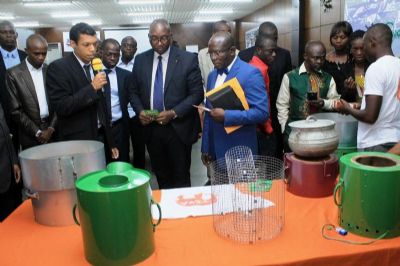Cocoanect’s PROCARBOOH initiative presented on the National day for Clean Energy in Abidjan.
On Thursday the 8th of June, a conference for the national day for clean energy was organized by the Ivorian Alliance for Clean Cooking (CIACC), the governmental agency Interprofessional Fund for Agricultural Research and Consultancy (FIRCA), The National REDD+ platform, and cocoa trading company Cocoanect. Government officials, NGO’s and companies active in the clean energy sector gathered to discuss environmental and health issues related to extensive use of charcoal and firewood in rural areas.
Participants from the Ministry of Environment and Sustainable Development, the Ministry of Energy, the Ministry of Water and Forest, the Agency Conseil Café & Cacao, the African Development Bank, the World Food Program and the Center for Renewable Energy and Energy Efficiency joined the conference, as well as local companies BriqueAfrique (briquettes made of bio residue) and Green Ker (producer of Clean Cooking Stoves). Foreign representatives from GIZ Senegal, the Laboratory of Improved Cooking Stoves of IRSAT in Burkina Faso, and Katenekaji from Mali (Producer of Clean Cooking Stoves) were also present.
The use of more efficient cook stoves was one of the key interventions being discussed at the conference. Today, the traditional stone open fires result in big blankets of indoor smoke, causing respiratory infections and the premature death of about 22.000 Ivorians per year. Moreover, the local population largely depends on charcoal and firewood for cooking, which contributes to forest degradation and deforestation. Introducing improved cook stoves may reduce environmental pressure and improve health conditions, in particular for women and children.
Chair of the CIACC, Mr Jibikilayi Honoré underlined the need for cleaner energy: “C’est un problème de développement, c’est un problème social, un problème de santé publique pour lequel tout le pays devrait se lever”.


In 2016, Cocoanect launched the PROCARBOOH initiative in collaboration with CIACC, the FIRCA and the national department of REDD+. The aim of the program is to quantify the potential impact of improved cookstoves and to test different ways of distribution and local production of these cookstoves. In May 2017, a total of 1500 respondents in Abidjan, the Western cocoa region and the Northern cotton region were interviewed for baseline studies.
A working capital investment in local stove manufacturer GreenKer boosted the local production to circa 750 stoves per month and stimulated the development of new prototypes which will be tested in the next couple of months with farmer and urban households.
Cocoanect is integrating the PROCARBOOH initiative with gender and forest conservation programs. A total of 700 households will be targeted in the pilot, after which the project has potential of scaling up with the preferred models for clean cooking stoves. We are looking forward to present the results of these first pilots during the second clean energy conference in Abidjan in October 2017.